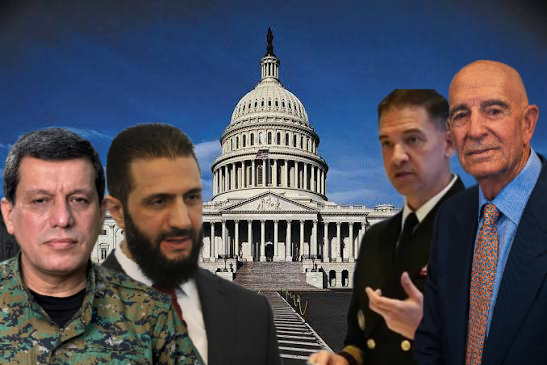Steven Sahiounie, journalist and political commentator
In a seismic shift that signals a new chapter for a post-Assad Syria, two landmark developments are reshaping the nation’s political and military landscape. The United States Senate has voted to repeal the crippling Cesar sanctions regime, dismantling a key pillar of pressure against the country. Simultaneously, the Syrian Democratic Forces (SDF) have announced that a military delegation is heading to Damascus to begin the formal process of integrating into a new, unified Syrian national army.
These parallel moves mark the most significant steps yet toward stabilizing and rebuilding the war-torn country, suggesting a coordinated international and local effort to move beyond a decade of conflict and division.
The End of the Caesar Act
On October 10, U.S. Senator Jeanne Shaheen announced the Senate had passed “The National Defense Authorization Act (NDAA) to repeal the outdated Caesar sanctions on Syria. This is a historic milestone that will help Syrians recover from decades of conflict and move toward stability.
In a move hailed by Damascus as a “positive and responsible development,” the U.S. Senate has approved a provision to formally repeal the Caesar Syria Civilian Protection Act. The sanctions, first implemented in 2020, were designed to economically strangle the government of Bashar al-Assad and hold it accountable for widespread human rights abuses.
“The harsh sanctions were imposed on a regime that fortunately no longer exists,” Republican Representative Joe Wilson, who has championed the repeal, stated on X. He thanked the Senate for its decision, adding that the full repeal “now depends on the success of Syria.”
The Syrian Ministry of Foreign Affairs swiftly welcomed the decision. In a statement, the ministry noted that the Caesar Act was imposed on the “previous regime for its crimes” and that its continuation “leaves grave humanitarian and economic effects on the Syrian people.” The ministry expressed its appreciation for the “responsible American approach,” viewing the vote as a “constructive step towards correcting the course of bilateral relations” that could foster regional stability and create opportunities for economic and humanitarian cooperation.
The act targeted key sectors like energy and construction, effectively cutting Syria off from the global economy. While intended to punish the regime, it led to hyperinflation, widespread poverty, and immense challenges for humanitarian aid delivery, disproportionately affecting civilians. The Senate’s vote to dismantle this framework signals a definitive U.S. policy shift from punishment to enabling reconstruction under a new government.
Forging a Unified Force: SDF to Join Syrian Army
In a historic announcement coinciding with the 10th anniversary of the force’s founding, SDF General Commander Mazloum Abdi declared that the process of joining the Syrian Ministry of Defense is underway.
“A military committee from the SDF will head to Damascus soon to discuss the mechanism for joining the Syrian Ministry of Defense,” Abdi stated, explaining the move is part of implementing the March 10 agreement.
He framed the integration as part of “a new phase aimed at building a unified Syrian army,” of which the SDF will be a “strong and influential part.” The military delegation, he confirmed, would be dispatched “within the coming days” to begin the formal process.
Abdi emphasized the value his forces would bring to the new national military. “The experience the SDF has gained in the war against ISIS, along with the training and the popular and international support it has received, will make it a supportive and impactful force within the new Syrian army,” he stressed.
This move is a monumental step towards resolving one of the Syrian conflict’s most complex internal divisions. The integration of the battle-hardened and U.S.-backed SDF into a national command structure would unify the country’s security apparatus, a critical requirement for long-term stability and sovereignty.
The Path Forward
On October 7, the World Bank issued a report describing the economic situation in Syria as “highly volatile.” The report called for security improvements, institutional stability, repealing of sanctions, and international investment projects.
The report blamed the past war and US-EU sanctions for the decline of the economy, which struck tourism, energy and manufacturing sectors.
About 12% of the Syrians abroad have returned home, and this poses immediate burdens on the economy, but offers future growth by the increase of the supply and skills learned abroad.
On June 25, the World Bank announced the approval of a $146 million grant to help Syria restore electricity. The grant approved is known as
the “Syria Emergency Electricity Project” (SEEP).
Jean-Christophe Carret, World Bank Director for the Middle East, said that the most urgent need for economic recovery is restoring the power sector.
In May, US ambassador to Turkey, Tom Barrack, who has also been appointed as special envoy to Syria, visited the capital, Damascus, to inaugurate the American Ambassador’s residence, which was the first step towards re-opening the US Embassy since its 2012 closure.
After meeting with Syrian President Ahmad al-Sharaa, Barrack attended the signing of an agreement for a consortium of Qatari, Turkish and US companies for development of a 5,000-megawatt energy project to restore Syria’s war-battered electricity grid.
Together, the repeal of the Caesar sanctions and the unification of military forces represent a powerful dual-track approach to building a new Syria. The removal of economic restrictions opens the door for international investment and aid crucial for reconstruction. At the same time, the creation of a single national army addresses the fundamental security dilemma that has plagued the country for over a decade.
While the road ahead remains fraught with challenges—from political reconciliation to rebuilding shattered infrastructure—these developments represent the clearest and most hopeful vision for Syria’s future to date. The international community and Syria’s own leaders appear to be seizing a historic opportunity to finally turn the page on a devastating war.
Steven Sahiounie is a two-time award-winning journalist.



